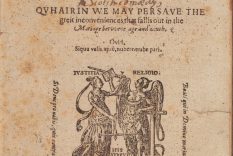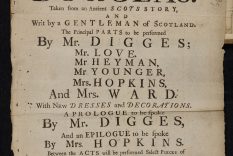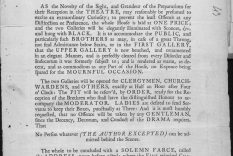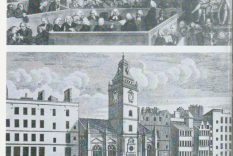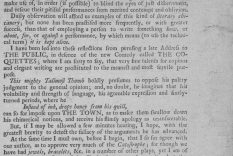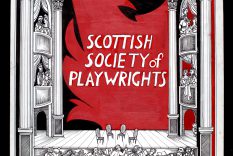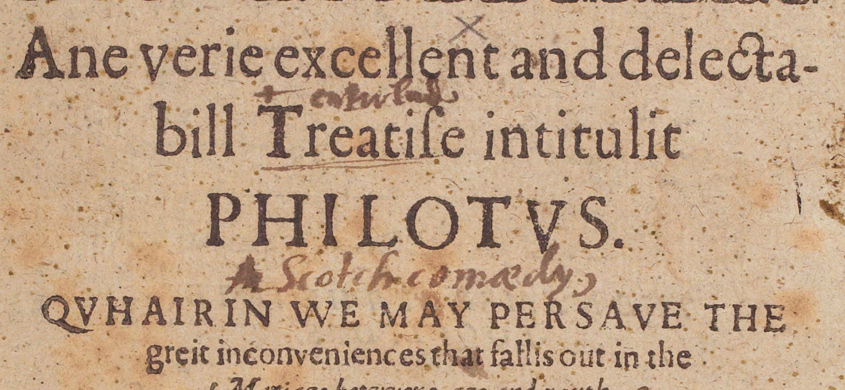
‘Philotus’ an ‘The Assemblie’ (also kent as ‘The Phanaticks’) are twa plays in Scots. Philotus wis scrievit aroond the late 16th century, an ‘The Assemblie’ – as it wis orginally kent – in the late 17th century. These twa plays lie atween post-Reformation austerity an the hin-end o the religious strauchles that steered in Scotland ower the 17th century. Sir Davyd Lyndsay’s seminal morality play ‘Ane Pleasand Satyr of the Thrie Estatis’ – first performed in 1552 – is a tour-de-force that kythes Scotland in the grup o seismic political chynge. Theatrical drama in Scotland wad lairgely dwyne unner the moral scrutiny o Presbyterianism.
In the ‘Biographa Dramatica’ o 1812, Philotus wis descrived as ‘by far the most offensive drama ever produced’ an ‘sufficient proof of the barbarous state in which Scotland remained till civilised by its intercourse with England’. The play is an ootrageous Renaissance comedie o mainers – somewhit at odds wi the stents o Reformation discipline – whaur an 80-year-auld carle ettles tae mairry a 14-year-auld quine. Throu enticements tae riches an whiles thortit in intentions bi cantrips in cross-dressin, the tale unfaulds.
‘The Phanaticks’, originally kent as ‘the Assemblie’, has been attributit tae the pen o Edinburgh physician Archibald Pitcairne. The play, wi its Episcopalian sympathies, is a scarcely guised dingin agin the ‘haly wullies’ o Presbyterian authority in the eftircome o the Glorious Revolution an handselin o King William III tae the British throne.
Lear mair aboot Philotus an The Assemblie: Twa Plays
‘Philotus’, a script o undetermint authorship, bi dint o its leid an mainers wis thocht by airlier scholars tae hae been scrievit durin the reign o James V (d. 1542). Hooanivir mair recent studies hae attributit ‘Philotus’ tae makar Alexander Montgomerie (aboot 1550-1598), ane o King James VI’s ‘Castillian Band’ o coort airtists. It is jaloused tae hae been scrievit eftir 1581, adaptit intae a play frae the story ‘Of Phylotus and Emillia’, first imprentit in 1581 in the novels o Barnaby Riche. Riche’s story hooanivir borraes lairgely frae the Italian play ‘Gl’ Ingannati’, first staged in 1531 an imprentit in 1537. ‘Gl’ Ingannati’ is aften quotit as bein o muckle influence tae Shakespeare’s ‘Twelfth Night’. Wi nae original manuscript extant, gin placed atween 1581 an the first kent imprent in 1603, this maks ‘Philotus’ Scotland’s ainly survivin Renaissance play, as defined bi the period 1562-1642.
The plot o ‘Philotus’ is alang kenspeckle farcical lines o mistaken identity, cross-dressin, woundit pride an moral resolution. As the introduction states, here is ‘Ane Verie excellent and delectabill Treatise intitulit PHILOTVS, quhairin we may persaive the great inconveniences that falls out in the marriage between age and youth.’
Philotus is an 80 year auld carle wha taks a fancy tae 14 year auld Emily. Tae dae his biddin he fees a patter-merchant cried the Macrell wha tries tae whowe Emilie wi enticements o gowd an riches that will befaw her gin she mairries the auldyin. Oot-throu these dialogues a commentator cried The Pleasant leas the audience in nae doot as tae the unpleasant prospecks o Emilie’s mairrit life wi the auld bauchle. Faur frae enamourt wi the wheedlins o the Macrell, Emilie slings him a deefie an expresses her scunneration at the thocht o bein mairrit Philotus:
‘His eine half-sunken in his heid,
His Lyre far caulder than the Leid,
His frosty flesch as he war deid,
Will for na happy heit:
Unhealthsom hosting ever mair,
His filthsum flewme is naething fair,
Aye rumisching wi rift and rair
Now, wow gif that be sweit.’
Nae tae be dinged doon, Philotus gangs tae Emilie’s faither wha consents tae him her haund in marriage, lowsin at ane potential straik a dochter, whiles winnin a son-in-law mair nor twice his ain age. The play gangs on wi Philotus mistakenly mairryin Emilie’s lang-lost cross-dressin brither Philerno, wha then succeeds in fleetchin the Huir tae the ready matrimonial bed jist afore the secret o his manhood is discovert bi the injured pairty. Emilie, nou dressed as a loon, has taen up wi true luve Flavius wha whiles in toon has witnessed the waddin o Philotus an Emilie (actually Flavius), makkin him believe that the Emilie wha noo confronts him is a demon.
Whan aw is resolved Philotus awns tae his vauntiness an blee-heidedness:
‘For thocht my folie did the Lord offend
Yet my gude God hes wrocht all for the best:
And this rebuik he thairfoir me to send,
All sik inordinate things to detest,
Quhilk sweit rebuik I reckon will the rest,
From fatherlie affection to proceed,
That vthers with like passions possest
May leirne be my exampill to tak heid.’
The rhymin verse in ‘Philotus’ follaes the octet or aicht line stanza as yaised in an aulder poem cried ‘The Gaberlunzie Man’, jaloused tae hae been scrievit bi King James V.
It is unkent as tae whaur an when ‘Philotus’ wis actually staged. Aiblins, gin ‘Philotus’ wis the wark o King James the Saxt’s ‘Castillian Band’ then this ‘delectabill treatise’ wid hae been performed at the Royal Scottish coort . The actual stagin o ‘The Assemblie’ is likeweys unkent.
In John MacQueen’s foreword tae ‘The Phanaticks’, imprentit bi the Scottish Texts Society in 2012, the editor notes ‘The language’…(of the play ‘The Assemblie’)…’confirms that performances took place in Edinburgh, possibly in some great house’. He furder alludes – frae a memoir – tae plays bein performed in Edinbrugh in the year 1710, and that dramatic warks wir staged ‘at least occasionally at the Tennis Court in Canongate’. Gien the heretical nature o Pitcairne’s play, it appears intendit fir a strictly private audience. As the Prologue notes, ther has been a gey scarcity o theatrical entertainment in Scotland lang syne.
‘It’s a long whyle since any play hath been
Except rope dancing, in owre natione seen
Yea, but in this our all reforming Age,
We have a Play, the Pulpit turn’d a stage’
In the turnin o the pulpit tae stage, Pitcairne’s play stood contrar tae the Kirk’s Acts of Assembly of 1574:
‘That no comedies or tragedies or such plays, should be made on any subject of canonical Scripture, nor on the Sabbath day. If any minister be the writer of such a play, he shall be deprived of his ministry. As for plays of another subject, they also should be examined before they be propounded publicly.’
The kirk’s disapproval o theatre wid bide on in Edinbrugh oot-throu the first hauf o the 18th century, frae Allan Ramsay’s attempts tae estaiblish a play-hoose in Carruber’s Close tae the stagin o Rev John Home’s ‘The Douglas’ in 1756, an event which wid meet wi stern opposition, nae least awin tae Home’s cawin as a meenister. A satirical parody frae the period, aimed at the Presbytery o Edinbrugh, aiblins sets the muid.
‘It is agreed upon by sober pagans themselves that playactors are the most profligate wretches and vilest vermin that hell ever vomited out: that they are the filth and garbage of the earth, the scum and stain of human nature, the excrement and refuse of all mankind: the pests and plagues of human society; the debauchers of men’s minds and morals, unclean beasts, idolatrous papists or atheists, and the most horrid and abandoned; villains that ever the sun shone upon.’
It is tauld near tae the ootset o the ‘The Assemblie’ hou Edinbrugh is a city dividit bi Whig an Jacobite factions, and hou it is possible tae move atween KW (King William) and KJ (King James) territories ‘betwixt the Strait Bowe and the Cross’. These divisions are evident in the trystin atween the pro-Jacobite Novell an his dramatic contrair Visioner:
Novell: King Willie, that Monkie in royall robs, that Cretur of the Giddie rable, that blasing star of a Dutch fog, which will go away in Smoack!
Visioner: King Jamie, a meir emptie title, by the grace of God king of Great Limerick, Athlone and Galloway! A deserter, a runaway, the ffrench King’s first pensioner of State!
The play gies braid commentary on the 1689 Claim of Right an whummlin o the Episcopacy. Whiles movin throu Edinbrugh, frae Lady Murray’s Yard tae Abbeygate an The Cross, it draws observations on a pack o Presbyterian meenisters wha ettle tae uphaud ther ain offices bi dingin-doun thaim considert less haly or as non-conformist tae the new political order. In the dialogues atween Frank an Will at Parliament Close, the kirk an its Presbyterian aristocracy are glisked wi scunnersome disdain.
Whiles the play is written maistly in Middle Scots, wi considerable English influence, chairacterisation is whiles yaised throu shifts in vyces. The Ruling Elder is gien a particularly braid Scots tung, as if tae accentuate his narraness o thocht.
The chairacters, wi ther sympathies an prejudices, lea gey narra scowth fir the imagination. The play is stridently pro-Episcopalean an wis imprentit aroond the same time as ‘Scotch Presbyterian Eloquence’ (1692), a fairce polemic forenenst the praticks o the Reformed kirk.
Archibald Picairne (1652-1713) wis author o ‘The Assemblie’. He became an eminent surgeon wha wid heeze up Edinbrugh’s reputation as a centre o medical excellence. Pitcairne wint on tae teach at the University o Leiden in the Netherlands an wis proponent o a theory anent the relationship atween human physiology an Newtonian physics. His views wir aften highly contentious an his belief in mathematics as the foondin principle o life led tae chairges o atheism bein levelled agin him – a shockin accusation in its time. As weel as scrievin mony treatises in Latin, Pitcairne scriveit anither satire forenenst the kirk, cried ‘Babell: A Satirical Poem on the General Assembly in the year MDCXCII Written originally in the Irish Tongue and Translated into Scottish, for the benefite of the Leidges’.
Archibald Pitcairne is yirdit in the Greyfriars kirkyaird o Edinbrugh. Follaein his daith in 1713 his library wis bocht fir the Czar o Russia, a muckle literary collection that bides tae the present day in St. Petersburgh.
Philotus wis revived fir a run at the Edinbrugh Fringe in 2008.
The National Leebrar hauds a 1603 version o Philotus, as imprentit bi Robert Charteris in Edinburgh. It alsae hauds an 1835 Bannatyne Club imprent. Baith o these copies are imprentit in Gothic text. The Bannatyne Club imprent o Philotus is available online.
An original manuscript o Archibald Picairne’s play ‘The Assemblie’, scrievit in the late 17th or early 18th century is haudit at the Leebrar’s manuscript collections, as weel as 1722, 1752 an 1766 imprents. The rare books department also hauds an 1830 copy o Pitcairne’s satirical poem ‘Babell’.
Editor John MacQueen’s ‘The Phanaticks’, imprentit bi the Scottish Text Society in 2012, gies a standard text version frae an early manuscript o ‘The Assemblie’, as weel as a rowth o information on the backgrun an author.
‘Philotus’ and ‘The Assemblie’ (aslo known as ‘The Phanaticks) are two plays in Scots. Philotus was written around the late 16th century and ‘The Assemblie’ – as it was originally known – in the late 17th century. These two plays lie between post-Reformation austerity and the end of the religious struggles that stirred in Scotland throughout the 17th century. Sir Davyd Lyndsay’s seminal morality play ‘Ane Pleasand Satyr of the Thrie Estatis’ – first performed in 1552 – is a tour-de-force which demonstrates Scotland in the grip of seismic political change. Theatrical drama in Scotland would then largely wither under the severe moral climate of Presbyterianism.
In the ‘Biographa Dramatica’ of 1812, ‘Philotus was described as ‘by far the most offensive drama ever produced’ and ‘sufficient proof of the barbarous state in which Scotland remained till civilised by its intercourse with England’. The play is an outrageous Renaissance comedy of manners, somewhat at odds with the strictures of Reformation discipline, where an 80-year-old man sets out to marry a 14-year-old girl. Through enticements to riches and being thwarted in his intentions by frolics in cross-dressing, the tale unfolds.
‘The Phanaticks’, originally known as ‘the Assemblie’, has been attributed to the pen of Edinburgh physician Archibald Pitcairne. The play, with its Episcopalian sympathies, is a thinly disguised ranting against the ‘holy willies’ of Presbyterian authority in the aftermath of the Glorious Revolution and investiture of King William III to the British throne.
Learn more about Philotus an The Assemblie: Twa Plays
‘Philotus’, a script of undetermined authorship, owing to its language and manners was thought by earlier scholars to have been written during the reign of James V (d. 1542). However more recent studies have attributed ‘Philotus’ to poet Alexander Montgomerie (about 1550-1598), one of King James VI’s ‘Castillian Band’ of court artists. It is surmised to have been written after 1581, adapted into a play from the story ‘Of Phylotus and Emillia’, first published in 1581 in the novels of Barnaby Riche. Riche’s story however borrows largely from the Italian play ‘Gl’ Ingannati’, first staged in 1531 and published in 1537. ‘Gl’ Ingannati’ is often quoted as being highly influential to Shakespeare’s ‘Twelfth Night’. With no original manuscript extant, if placed between 1581 and the first known publication in 1603, this makes ‘Philotus’ Scotland’s only surviving Renaissance play, as defined by the period 1562-1642.
The plot of ‘Philotus’ is along familiar farcical lines of mistaken identity, cross-dressing, wounded pride and moral resolution. As the introduction states, here is ‘Ane Verie excellent and delectabill Treatise intitulit PHILOTVS, quhairin we may persaive the great inconveniences that falls out in the marriage between age and youth.’
Philotus is an 80 year-old man who desires 14 year-old Emily. To do his bidding he hires a loquacious character called the Macrell who tries to woo Emilie with enticements of gold and riches that will befall her if she marries the old man. During these dialogues a commentator called The Pleasant leaves the audience in no doubt as to the unpleasant prospects of Emilie’s married life with the old fellow. Far from impressed by the beguilements of the Macrell, Emilie ignores him and expresses her disgust at the thought of marriage to Philotus:
‘His eine half-sunken in his heid,
His Lyre far caulder than the Leid,
His frosty flesch as he war deid,
Will for na happy heit:
Unhealthsom hosting ever mair,
His filthsum flewme is naething fair,
Aye rumisching wi rift and rair
Now, wow gif that be sweit.’
Not to be defeated, Philotus goes to Emilie’s father who consents to give him her hand in marriage, losing at one potential stroke a daughter, while gaining a son-in-law more than twice his own age. The play goes on with Philotus mistakenly marrying Emilie’s long-lost cross-dressing brother Philerno, who then succeeds in seducing the Huir to the prepared matrimonial bed just before the secret of his manhood is discovered by the injured party. Emilie, now dressed as a boy, has taken up with true love Flavius who when in town in town has witnessed the wedding of Philotus and Emilie (actually Philerno), making him believe that the Emilie who now confronts him is a demon.
When all is resolved Philotus owns to his vanity and dim-wittedness:
‘For thocht my folie did the Lord offend
Yet my gude God hes wrocht all for the best:
And this rebuik he thairfoir me to send,
All sik inordinate things to detest,
Quhilk sweit rebuik I reckon will the rest,
From fatherlie affection to proceed,
That vthers with like passions possest
May leirne be my exampill to tak heid.’
The rhyming verse in ‘Philotus’ follows the octet or eight line stanza as used in an older poem called ‘The Gaberlunzie Man’, thought to have been written by King James V.
It is unknown as to where and when ‘Philotus’ was actually staged. Possibly, if ‘Philotus’ was the work of King James the VI’s ‘Castillian Band’ then this ‘delectabill treatise’ would have been performed at the Royal Scottish court. The actual staging of ‘The Assemblie’ is similarly unknown.
In John MacQueen’s foreword to‘The Phanaticks’, published by the Scottish Texts Society in 2012, the editor notes ‘The language’…(of the play ‘The Assemblie’)…’confirms that performances took place in Edinburgh, possibly in some great house’. He further alludes – from a memoir – to plays being performed in Edinburgh in the year 1710, and that dramatic works were staged ‘at least occasionally at the Tennis Court in Canongate’. Given the heretical nature of Pitcairne’s play, it appears intended for a strictly private audience. As the Prologue notes, there has been a real scarcity of theatrical entertainment in Scotland for many years.
‘It’s a long whyle since any play hath been
Except rope dancing, in owre natione seen
Yea, but in this our all reforming Age,
We have a Play, the Pulpit turn’d a stage’
In the turning of the pulpit to stage, Pitcairne’s play stood at odds to the Kirk’s Acts of Assembly of 1574:
‘That no comedies or tragedies or such plays, should be made on any subject of canonical Scripture, nor on the Sabbath day. If any minister be the writer of such a play, he shall be deprived of his ministry. As for plays of another subject, they also should be examined before they be propounded publicly.’
The churches’ disapproval of theatre would prevail in Edinburgh throughout the first half of the 18th century, from Allan Ramsay’s attempts to establish a play-house in Carrubers Close to the staging of Rev John Home’s ‘The Douglas’ in 1756. This was an event which would meet with stern opposition, not least owing to Home’s calling as a minister. A satirical parody from the period, aimed at the Presbytery of Edinburgh, possibly sets the mood:
‘It is agreed upon by sober pagans themselves that playactors are the most profligate wretches and vilest vermin that hell ever vomited out: that they are the filth and garbage of the earth, the scum and stain of human nature, the excrement and refuse of all mankind: the pests and plagues of human society; the debauchers of men’s minds and morals, unclean beasts, idolatrous papists or atheists, and the most horrid and abandoned; villains that ever the sun shone upon.’
It is told near tae the beginning of ‘The Assemblie’ how Edinburgh is a city divided by Whig and Jacobite factions, and how it is possible to move between KW (King William) and KJ (King James) territories ‘betwixt the Strait Bowe and the Cross’. These divisions are evident in the meeting between the pro-Jacobite Novell and his dramatic counterpart Visioner:
Novell: King Willie, that Monkie in royall robs, that Cretur of the Giddie rable, that blasing star of a Dutch fog, which will go away in Smoack!
Visioner: King Jamie, a meir emptie title, by the grace of God king of Great Limerick, Athlone and Galloway! A deserter, a runaway, the ffrench King’s first pensioner of State!
The play gives broad commentary on the 1689 Claim of Right and overthrow of the Episcopacy. While moving through Edinburgh, from Lady Murray’s Yard to Abbeygate and The Cross, it draws observations on a gathering of Presbyterian ministers who look to upholding their offices by bringing down those considered less devout or as being non-conformist to the new political order. In the dialogues between Frank and Will at Parliament Close, the church and its Presbyterian aristocracy are glimpsed with a loathing disdain.
While the play is written mainly in Middle Scots, with considerable English influence, characterisation is used at times through shifts in voices. The Ruling Elder is given a particularly braid Scots tongue, as if to accentuate his narrowness of thought.
The characters, with their sympathies and prejudices, leave very little scope for the imagination. The play is stridently pro-Episcopalean and was written around the same time as ‘Scotch Presbyterian Eloquence’, (1692) a fierce polemic against the practices of the Reformed church.
Archibald Picairne (1652-1713) was author of ‘The Assemblie’. He became an eminent surgeon who would enhance Edinburgh’s reputation as a centre of medical excellence. Pitcairne went on to teach at the University of Leiden in the Netherlands and was the proponent of a theory concerning the relationship between human physiology and Newtonian physics. His views were often highly contentious and his belief in mathematics as the determining principle of life led to charges of atheism being levelled against him – a shocking accusation in its time. As well as writing many treatises in Latin, Pitcairne wrote another satire against the kirk, called ‘Babell: A Satirical Poem on the General Assembly in the year MDCXCII Written originally in the Irish Tongue and Translated into Scottish, for the benefite of the Leidges’.
Archibald Pitcairne is buried in the Greyfriars kirkyard of Edinburgh. Following his death in 1713 his library was bought for the Czar of Russia, an extensive literary collection that remains to the present day in St. Petersburgh.
Philotus was revived for a run at the Edinbrugh Fringe in 2008.
The National Library holds a 1603 version of Philotus, as published by Robert Charteris in Edinburgh. It also holds an 1835 Bannatyne Club publication, a digital version of which is available online. Both of these copies are printed in Gothic text. A copy of Philotus in standard print is also available online.
An original manuscript of Archibald Picairne’s play ‘The Assemblie’, written in the late 17th or early 18th century is held in the Library’s manuscript collections as 1722, 1752 and 1766 publications. The rare books department also holds a copy of Pitcairne’s satirical poem ‘Babell’.
Editor John MacQueen’s ‘The Phanaticks’, published by the Scottish Text Society in 2012, gives a standard text version from an early manuscript of ‘The Assemblie’ as well as a wealth of information on the background and author.
- Author:
- Publication Date:
- 1581
- Imprentit:
Philotus
Now give thy frie consent thairfoir,
Deck up and do thy self decoir,
Gang quickly to and say no moir
Thou man agree thairtill.Frae ‘Philotus’


